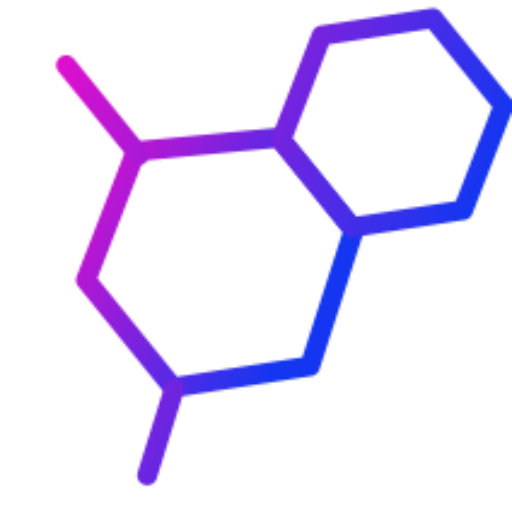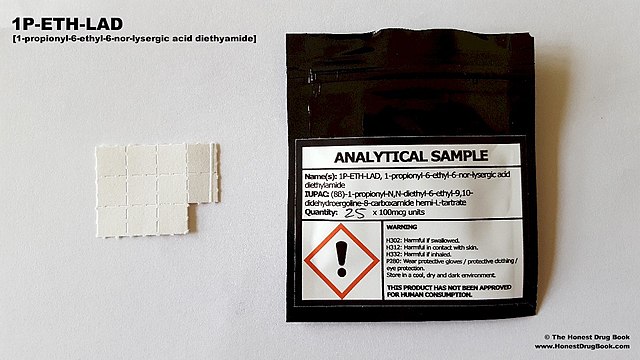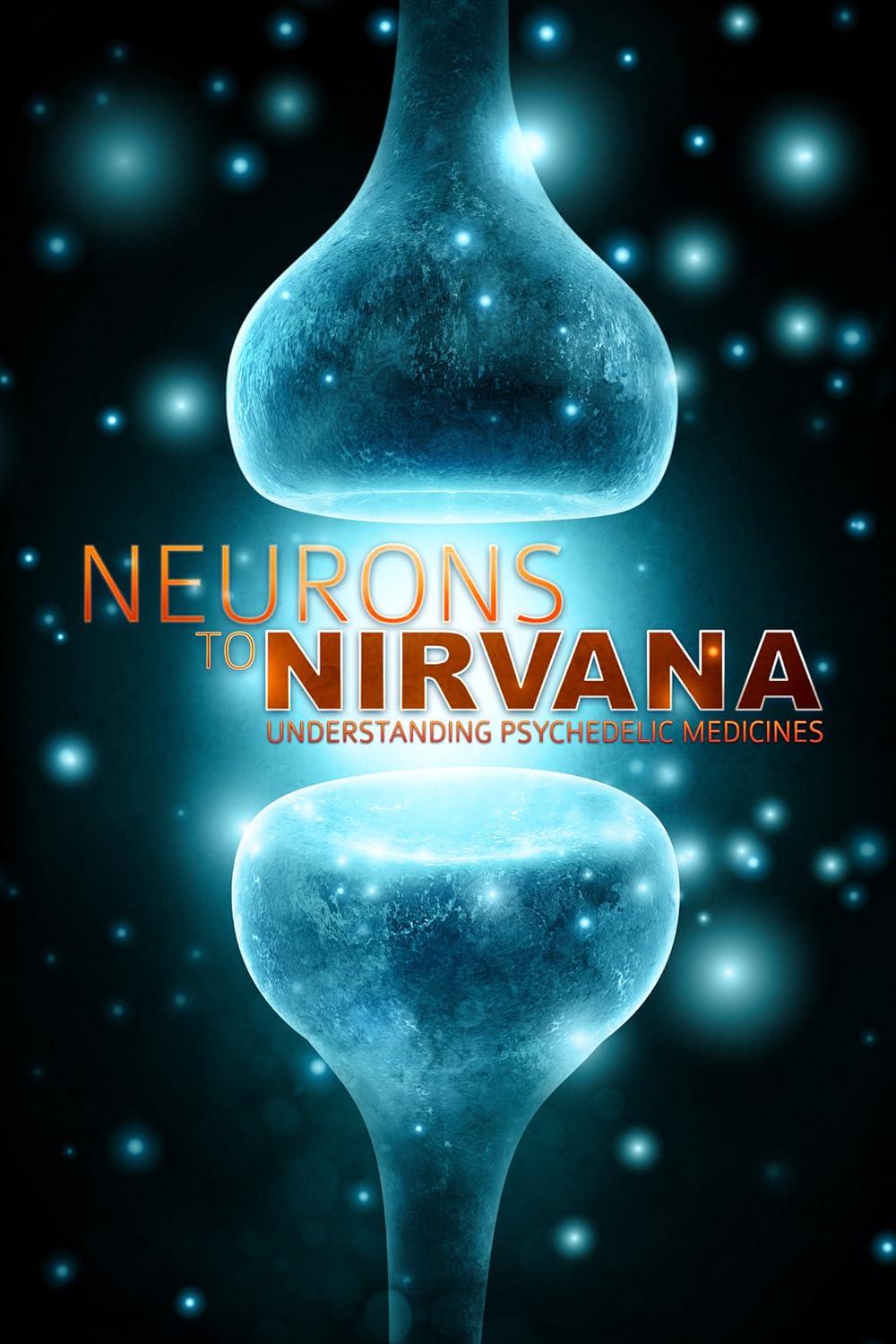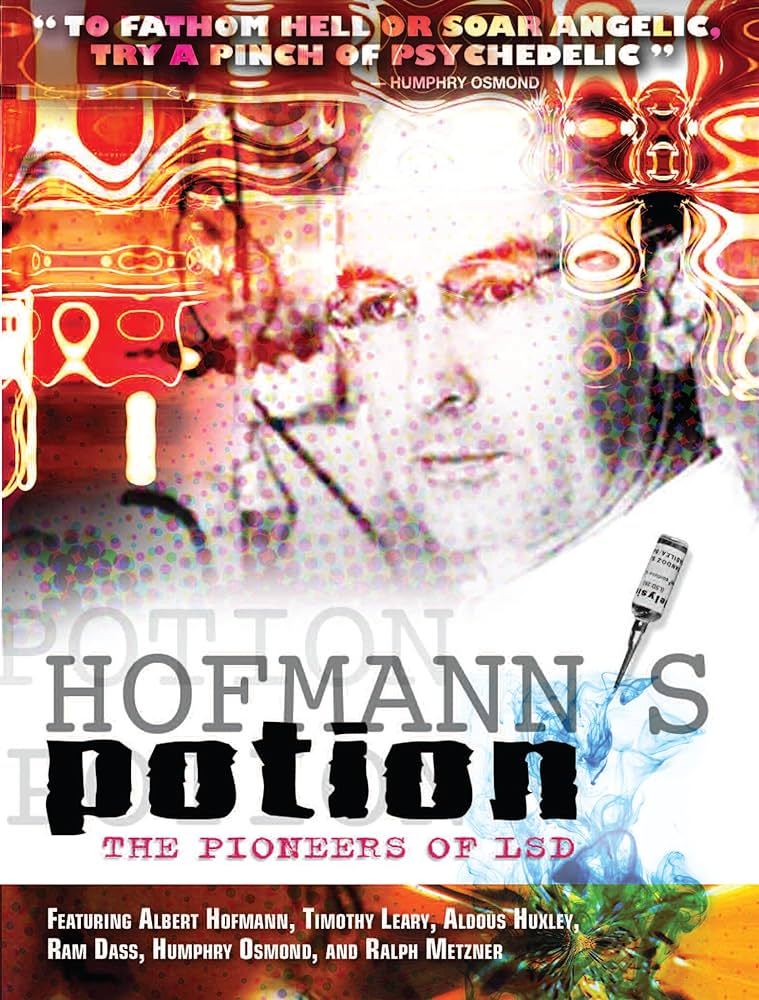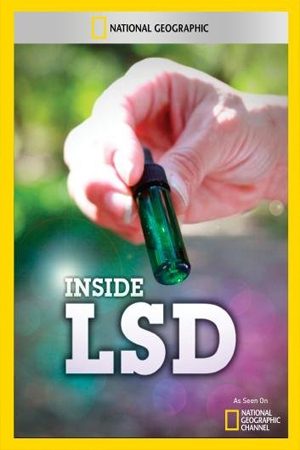SD (lysergic acid diethylamide) is just one of over a dozen related semi-synthetic psychedelics in the lysergamide family.
None of these research chemicals are as popular as the godfather, LSD, but they offer a unique and formidable psychedelic experience nonetheless.
In this guide, we’re going to take a deep dive into the world of ETH-LAD — one of the strongest members of the lysergamide class and a product of the late Alexander Shulgin himself.
What is ETH-LAD?
ETH-LAD stands for 6-ethyl-6-nor-lysergic acid diethylamide (quite a mouthful).
It’s a functional analog of LSD — which means it’s virtually the same compound in every way, except for one functional group that sticks out from the central nor-lysergic acid skeleton.
Based on how similar these molecules are from a structural perspective, you probably won’t be surprised to hear the effects of ETH-LAD are virtually identical to LSD.
Interestingly, ETH-LAD is more potent than LSD, according to the inventor, Alexander Shulgin. Shulgin tested the effects of this and other lysergic-acid derivatives on himself and his rag-tag team of psychonauts.
Shulgin reports the threshold dose (the minimum doses needed to produce noticeable effects) of ETH-LAD is just 15 micrograms. LSD has a threshold dose closer to 25 micrograms.
Overall, ETH-LAD is very comparable to LSD in terms of the psychedelic effects and intensity. ETH-LAD is slightly stronger at the same dose. It produces more intense visuals but also some unwanted physical sensations like increased urination and stomach discomfort.
ETH-LAD: Specs & Technical Details
| Active Ingredient | 6-ethyl-6-nor-lysergic acid diethylamide |
| Level of Risk | Low |
| Other Names | 1P-ETH-LAD (Prodrug) |
| Most Common Side-Effects | Stomach Discomfort & Increased Urination |
| Duration of Effects | 8–12 hours |
| Legality | Illegal in Most Countries (May Be Legal in Canada) |
What’s The Dose of ETH-LAD?
There’s never been any official clinical testing on ETH-LAD to elucidate the optimal dosing. However, there are many user reports available online that have helped establish some general dosage recommendations.
The general consensus is that the dose of ETH-LAD is somewhere between 50 and 200 micrograms.
These doses overlap with LSD and other lysergamide derivatives but more towards the lower side. ETH-LAD is the strongest of the mainstream lysergic acid psychedelics, followed by LSZ, LSD, 1P-LSD, and AL-LAD.
Here’s a breakdown of the dose levels for ETH-LAD:
- Microdose — 10 mcg
- Threshold Dose — 15–25 mcg
- Light Dose — 50 mcg
- Standard Psychoactive Dose — 100–200 mcg
- Heroic Dose — 200+ mcg
Most ETH-LAD comes in the form of a blotter square, which means you’ll need to cut the paper into smaller sections if you want a lighter dose.
It’s wise to keep your first dose to around 100 mcg or less.
This psychedelic is strong and can really creep up on you. Many ETH-LAD trip reports mention the experience starts to fade in slowly but picks up steam at an alarming pace if you aren’t ready for it.
Lighter lysergamides like AL-LAD may be a better option if you’ve never used psychedelics before. ETH-LAD is a formidable psychedelic that can induce deep mystical experiences. It also has a higher body-load than other members of this family, which can be a cause for alarm in people who aren’t familiar with psychedelics.
Microdosing ETH-LAD
It’s also possible to microdose with ETH-LAD. This psychedelic is best for promoting deeper and longer-lasting flow-states, inducing creative or out-of-the-box thinking, and helping to establish new routines or habits.
Most ETH-LAD suppliers sell this compound in the form of blotter squares. Each of which contains anywhere from 50 to 200 micrograms, so you’ll need to either split the blotters into smaller pieces or dilute them into a liquid (such as alcohol) before you can use them.
You can also buy premade microdosing liquid preparations online (where it’s legal), which allows you to use smaller doses more easily without accidentally going overboard.
The standard microdose for ETH-LAD is 10 mcg, but some people take up to 20 mcg.
The volume of liquid will vary significantly depending on concentration so it’s important to always follow the instructions on the bottle.
What Does ETH-LAD Feel Like?
The ETH-LAD experience is very similar to LSD — inducing audio and visual hallucinations and deeply introspective thought processes. The hallucinations from this substance remain based in reality. You won’t see any flying dragons or other made-up creatures or objects, and you remain cognizant of your environment, for the most part.
The hallucinations from ETH-LAD may include:
- Objects and patterns begin moving and merging together
- Animals or faces appear in shadows, clouds, or patterns
- Aspects of your environment take on a fractal or geometric shape or pattern
- Objects appear to be “vibrating,” and you will likely find it difficult to read or interact with electronic devices
- Sounds and music is interpreted differently — songs you’ve heard a million times may sound entirely different
Much like LSD, the ETH-LAD experience is usually positive. You feel a greater sense of connection with yourself, others, and your environment. Your experience will feel like a strange and wonderful adventure, even if you’re just sitting at home with some friends or walking through a park. Everyday experiences feel entirely different, you become curious, and you feel a sense of wonder with natural landscapes.

Can ETH-LAD Cause a Bad Trip?
While it’s true that most people who use ETH-LAD have a great time, the experience itself is highly dependent on your own thoughts and emotions. This can also be said for all psychedelic substances — not just ETH-LAD.
If you’re feeling down and depressed, anxious, or any other negative emotion, ETH-LAD is going to inflate that feeling significantly.
Bad trips aren’t uncommon with this psychedelic. This psychedelic’s subtle side effects on the body (stomach discomfort and increased urination) can cause psychonauts to begin panicking. This is also a phenomenon that happens with magic mushrooms when people start to feel nauseous or cramping from the mushrooms. This triggers a “bad vibe” that can completely derail the entire experience if the right trip sitter isn’t present to bring everything back on track.
There have never been any reports of serious injury or death caused by ETH-LAD, so it’s important to remember that any physical symptoms it causes are temporary and will eventually go away.
This is why it’s so important to follow the guidelines for responsible psychedelic use. A trip sitter should always be present, and you should take the time to set an intention before your trip. It’s also critical you carefully choose the conditions you’re going to trip under. This includes both the environment you plan to spend your time in, as well as the people that will be joining you.
How Long Does ETH-LAD Last?
ETH-LAD is a long-lasting psychedelic. The average trip from start to finish is around 9 hours, but it’s also common to hear about experiences lasting up to 12 hours in total. For reference, LSD lasts between 6 and 10 hours for most people.
The initial effects for ETH-LAD blotter paper take about 30 minutes before they start to show themselves. The effects come on slowly at first, starting with mild visual hallucinations (objects appear to be vibrating or breathing).
If you’re going to experience any body load (nausea or stomach discomfort), they usually start to appear around the 45-minute to the one-hour mark. The severity of these side effects varies from one person to the next but usually aren’t severe enough to warrant any intervention. This effect may last anywhere from 1 to 3 hours. Drinking some ginger tea prior to taking the ETH-LAD will significantly reduce your chances of experiencing this effect.
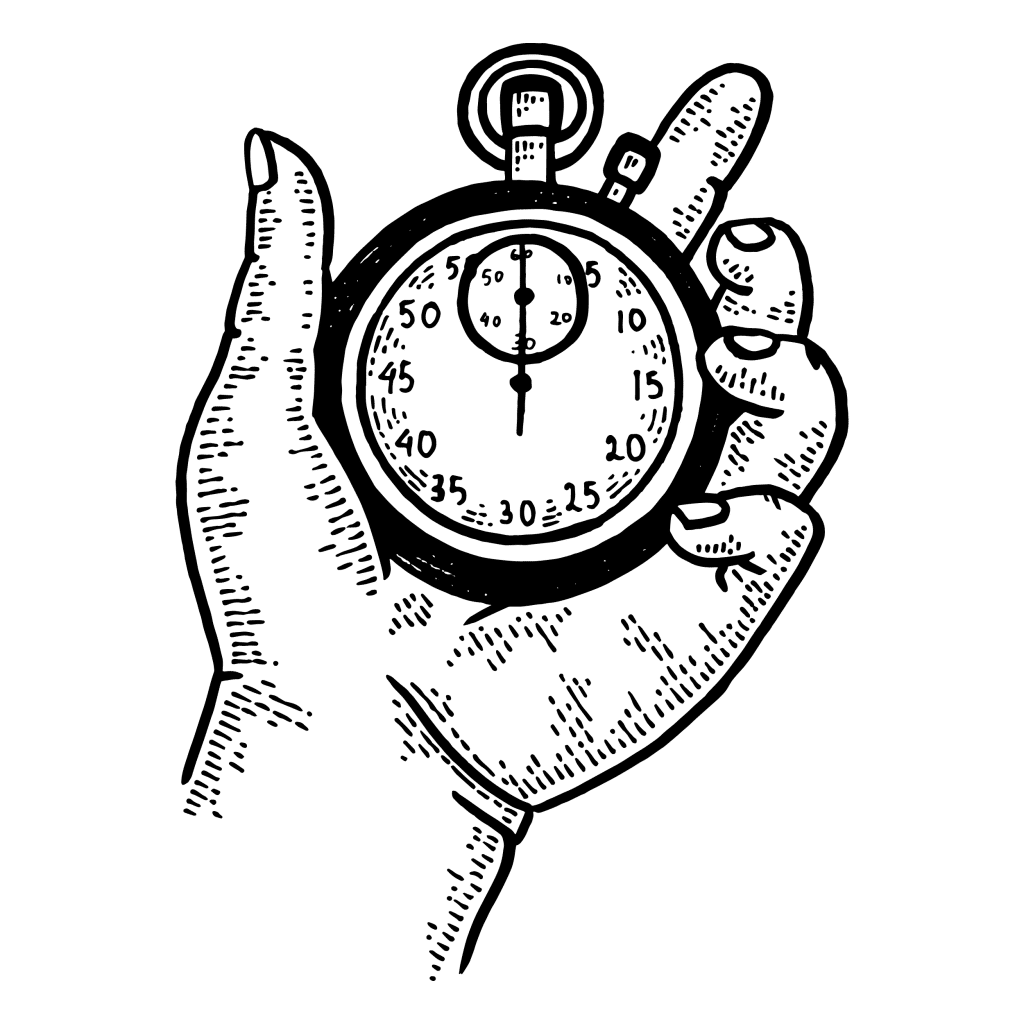
How to Take ETH-LAD
ETH-LAD is active at sub-milligram doses. There are very few psychedelics with this level of potency. Only the other lysergamide psychedelics (LSD, AL-LAD, LSZ, 1P-LSD, and PRO-LAD) and NBOMe substances (caution) are active at this low of a dose.
This dose is too low to safely dose by counting the number of drops of pure liquid forms. This is why most suppliers sell it in the form of a blotter paper soaked in ETH-LAD, a diluted liquid, or tablet forms.
The most common form is in a blotter square — which is standardized to contain around 150 mcg of active ingredient per 5 mm by 5 mm square.
To take ETH-LAD, place the blotter paper directly into your mouth. Hold it in your mouth for as long as you can before swallowing it whole. If you hold it under your tongue, you’ll experience the effects about 15 to 20 minutes quicker.
You can also make your own liquid ETH-LAD by dissolving the blotter into some water. This is a good way to share doses with other people or take microdoses.
Comparing ETH-LAD To Other Psychedelics
ETH-LAD is one of many related psychedelic substances. The central structure of this compound is nor-lysergic acid. The functional group (in this case, an ethyl group) is what differentiates most of the other members of the lysergamide group.
Here, we’ll compare ETH-LAD with the other members of this class, starting with the most potent (LSZ) to the least potent (LSA).
Note: There have been some early studies on this, such as a study that surveyed over 100 thousand people found LSD was more potent than LSD-analogs — but this research is inconclusive because the researchers grouped all the LSD-derivatives into one category instead of comparing them individually. As you’ll see, some analogs are stronger; some are weaker — so grouping them all together is unhelpful and inconclusive.
ETH-LAD vs. LSZ
ETH-LAD and LSZ (lysergic acid 2,4-dimethylazetidide) are considered the strongest of the mainstream lysergic acid derivatives. While ETH-LAD is slightly stronger, most people wouldn’t be able to tell the difference between the two.
LSZ produces slightly milder visuals and is less likely to cause physical side effects compared to ETH-LAD. Don’t misinterpret this — the visual experience associated with LSZ is formidable. Many people consider LSZ — especially the S,S isomer, to be even stronger than LSD itself.
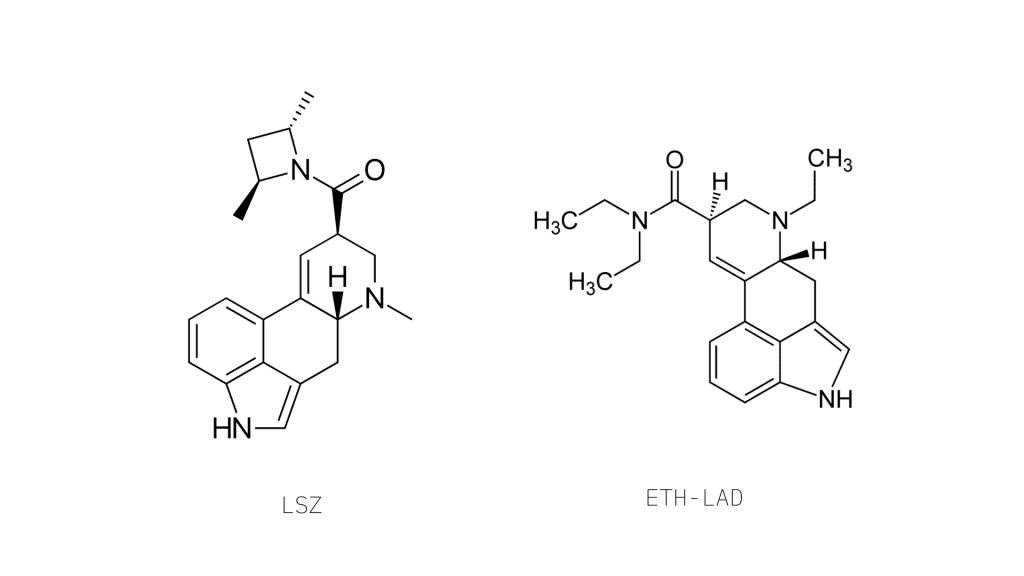
ETH-LAD vs. LSD
ETH-LAD shares a virtually identical chemical structure with LSD — the difference is the addition of one more carbon atom and three hydrogen atoms at the R6 group of the nor-lysergic acid skeleton in the ETH-LAD molecule.
Qualitatively, you’re unlikely to notice much of a difference in the effects of these psychedelics.
With that said, at the same dose, LSD is milder and less likely to produce physical side effects like stomach cramping or discomfort.
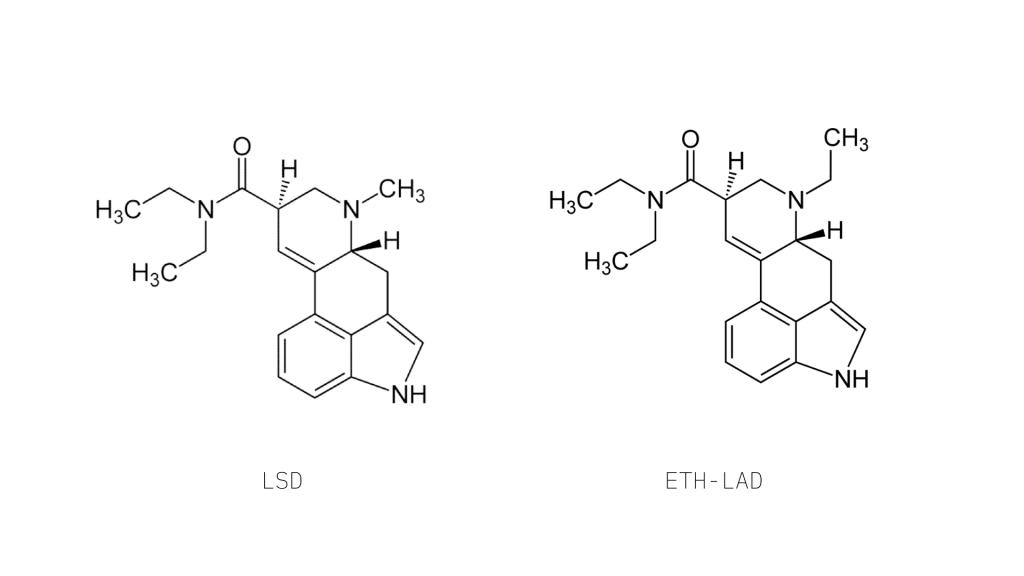
ETH-LAD vs. 1P-LSD
1P-LSD is a prodrug of LSD — which means it’s converted to LSD by the liver after you’ve ingested it. The effects are somewhat delayed because of this, but the experience is virtually identical to LSD.
Therefore, the same comparison applies when talking about the difference between ETH-LAD and 1P-LSD as it does for ETH-LAD and LSD. Generally speaking, ETH-LAD is going to have stronger visuals, the effects appear about 20–30% faster, and it produces a stronger physical “body load.”
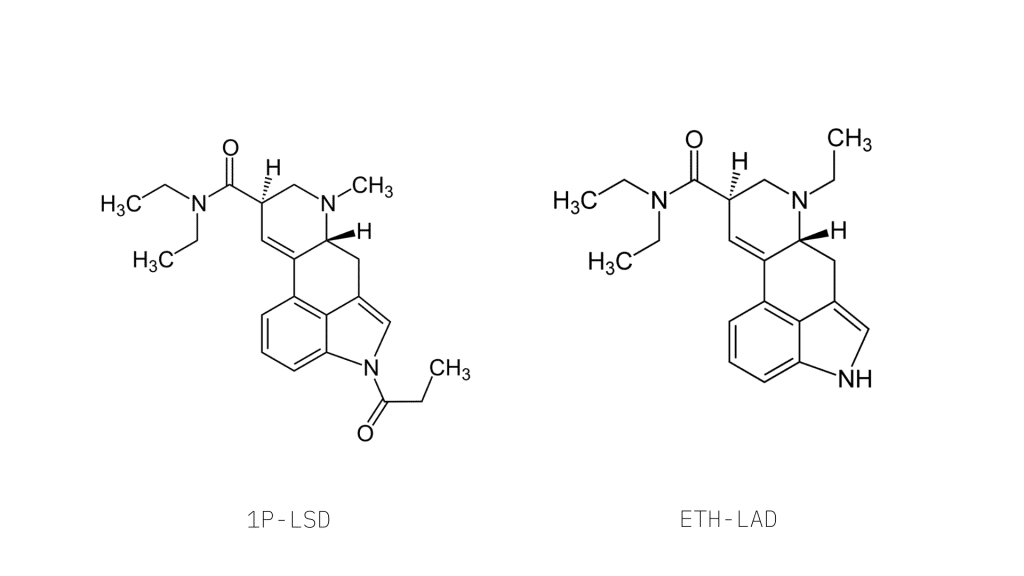
ETH-LAD vs. PRO-LAD
PRO-LAD is another analog of nor-LSD that shares a lot of similarities with ETH-LAD from a structural perspective. It’s the least explored of the lysergamide derivatives mentioned here, but the general consensus is that it’s milder than the same dose of ETH-LAD but around the same potency as LSD. The threshold dose is considered somewhere around 50 mcg.
PRO-LAD is considered better than ETH-LAD for promoting a sense of clarity and focus and is likely a better option for microdosing because of this quality. It isn’t so much a “deep thinker” or philosophical psychedelic but good for helping to tackle complex problems.
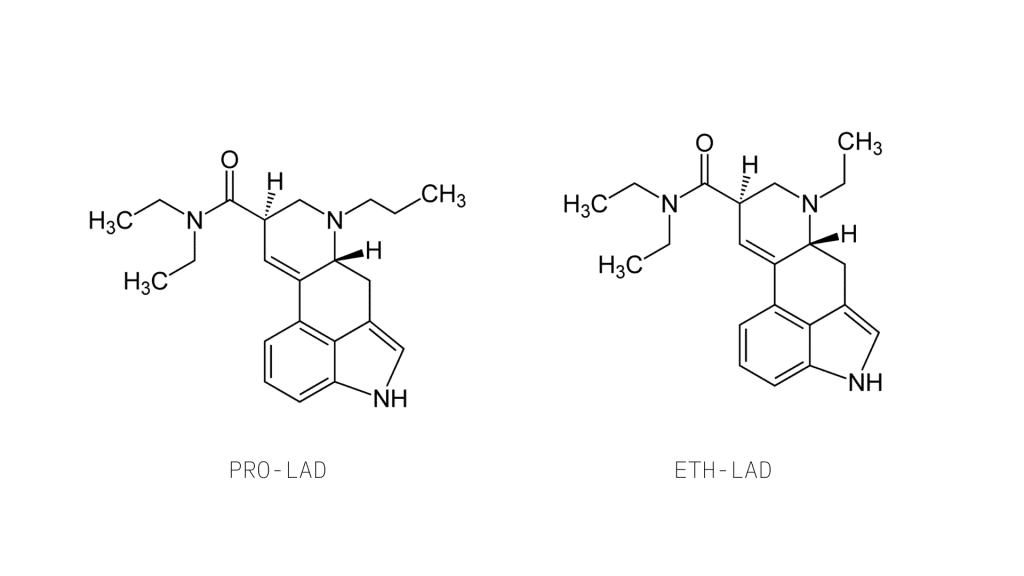
ETH-LAD vs. AL-LAD
AL-LAD is one of the mildest members of the lysergamide derivatives — but not by much. It’s still a formidable psychedelic that shouldn’t be underestimated.
However, when compared to ETH-LAD, AL-LAD is distinctly milder in terms of both the hallucinations, introspective thoughts, and body load. Many experts suggest AL-LAD is a good “beginner’s psychedelic” because it’s less likely to cause any physical sensations (body load) and is much less likely to force you to reframe your entire existence the way ETH-LAD does. The experience tends to be much more gentle — filled with a sense of awe and wonder, laughter, and general good vibes.
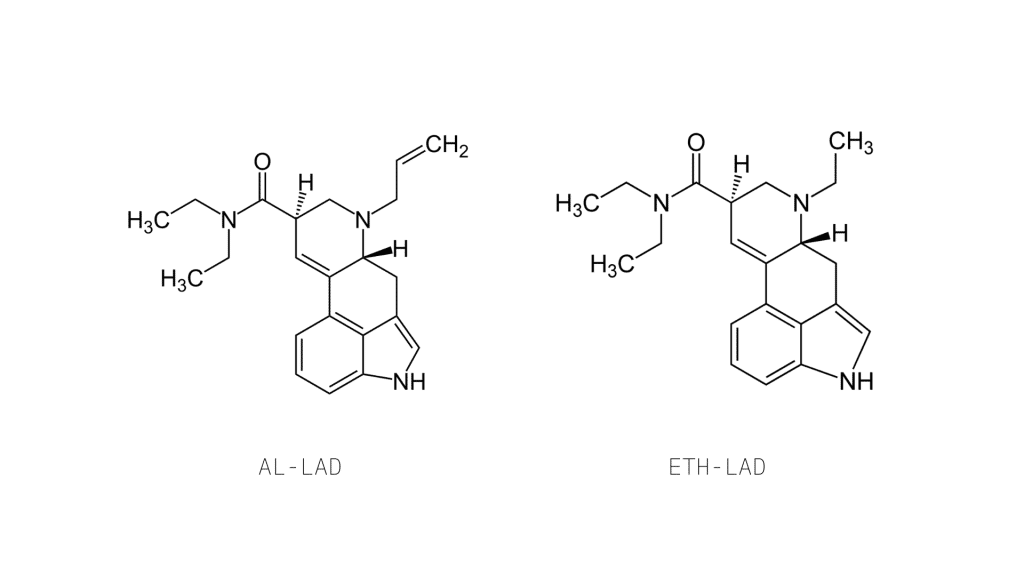
ETH-LAD vs. LSA
LSA (lysergic acid amide) is a lysergamide, but it’s a very different experience than ETH-LAD. LSA has a unique sedative component to it that gives the experience a much more lucid vibe. It’s a powerful psychedelic in its own right, but the threshold dose is about ten times higher than ETH-LAD at close to 500 mcg.
LSA has an even stronger body load than ETH-LAD, so it’s only recommended that experienced psychonauts give this one a try. The body load can be scary for people who aren’t familiar with psychedelics.
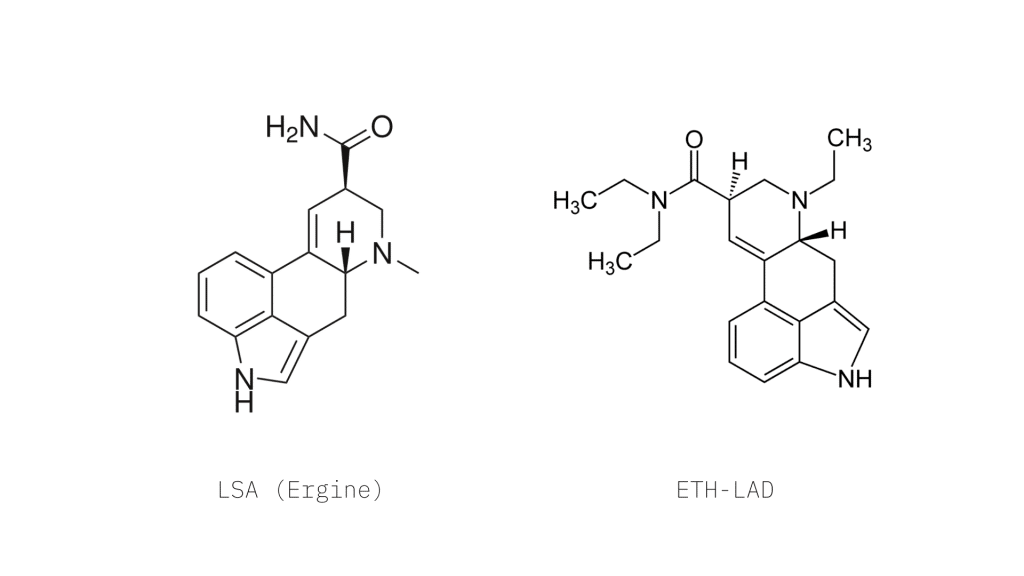
Is ETH-LAD Safe?
There have never been any conclusive studies on ETH-LAD involving human patients to prove it to be entirely safe or dangerous — however, there’s never been any indication this psychedelic poses any significant threat.
There’s never been a reported death or hospitalization from the effects of ETH-LAD itself, and from what we know about LSD and its analogs currently, there’s no indication this substance poses any particular threat. LSD and its derivatives have notoriously little impact in terms of physical health. For example, there is no known LD50 for LSD despite decades of research. You can’t really overdose on this stuff — physically, that is.
The psychological effects are another story altogether.
Any psychedelic brings some risk of psychological harm. In susceptible individuals, they may provoke a psychotic or schizophrenic episode or lead to a condition known as HPPD (hallucinogen persisting perception disorder).
In others, the sheer ontological shock of the experience can lead to lasting psychological harm in the form of PTSD, depression, or existential anxiety. This is why integration is so important when using psychedelics.
Always follow our guide to responsible psychedelic use before using ETH-LAD or any psychedelic substance.
Beware of Fake ETH-LAD
The main risk of using this substance isn’t the negative side effects of the compound itself, but the risk of adulteration with the more dangerous substance — NBOMe. So-called “fake acid” is becoming more common on the marketplace because of how expensive it is to make acid, in combination with its Schedule I status in most countries.
It’s possible that unethical vendors selling ETH-LAD may be selling NBOMe tabs under the name of ETH-LAD. This is the main reason why you should test your substances with a test reagent before you take them. NBOMe has caused deaths and is unlikely to produce an enjoyable experience. The test to identify NBOMe is very cheap, fast, and only requires a tiny sliver of your blotter.
How to Test ETH-LAD
Knowing how to test your substances with reagent test kits is a central component of responsible psychedelic use.
Like Reagan said during the cold war, “trust, but verify.”
Testing Psychedelic Substances Follows a Three-Step Process
- Divide a small sample of your ETH-LAD and place it on a clean surface (one sample per test)
- Place one drop of the reagent onto the sample and wait for it to change color
- Compare the color with the included chart that comes with your testing kit
What Reagents Should I Use For Testing ETH-LAD?
The main test for checking ETH-LAD is the Ehrlich reagent. This substance will react in the presence of an indole ring — which is a central component of all lysergamide derivatives as well as DMT (N,N-dimethyltryptamine) and psilocybin (magic mushrooms). If you only run one test, this is the one.
This test won’t differentiate between the indole alkaloids, but it will show you whether your sample contains an indole, or something else. If the reagent doesn’t turn purple, it means you don’t have an indole substance. Unfortunately, this means the tabs you have are not safe to use.
If you want to further differentiate the sample, you can use the Hofmann reagent to differentiate between LSD, ETH-LAD, 1P-LSD, ALD-52, AL-LAD, and more.
Here’s what your test should look like if your sample contains ETH-LAD:
- Ehrlich Reagent — Turns a purplish-pink color
- Hofmann Reagent — Turns a deep purple color

Is ETH-LAD Legal?
ETH-LAD is only specifically mentioned in the UK Misuse of Drugs Act — but this doesn’t mean it’s legal everywhere else.
Because this substance is an analog of LSD — which is listed as a controlled substance in virtually every country around the world, ETH-LAD and other lysergamide derivatives are illegal by proxy in any country that has some form of an analogs act or new psychoactive substances act. These laws make any compound with psychoactive effects or compounds that share similar structures to known prohibited substances illegal until manually removed.
Most countries have these laws, which would effectively ban ETH-LAD.
ETH-LAD is illegal in the United States, Germany, Latvia, Spain, France, The United Kingdom, Australia, and most of Europe.
Currently, the only place ETH-LAD is legal is in Canada. Even there, the laws aren’t cut and dry. ETH-LAD is legal only because it isn’t explicitly illegal.
What is 1P-ETH-LAD?
There’s also a related substance called 1P-ETH-LAD available. Similar to LSD and 1P-LSD, the difference here is the addition of a propionyl group attached to the central nitrogen atom in the molecule. Everything else is identical between these two substances.
Preliminary studies have shown that 1P-ETH-LAD is likely a prodrug of ETH-LAD
What Does The Future of ETH-LAD Look Like?
ETH-LAD is considered a research chemical because there’s very little we know about it in terms of academic research. There has been virtually no formal studies and certainly no clinical trials on this substance.
With that said, there is a ton of anecdotal research on the ETH-LAD experience, and this psychedelic is starting to generate a growing following of advocates. Its effects are virtually identical to LSD but with a stronger visual component.
As the laws regulating psychedelics continue to loosen, it’s likely we’ll see increased interest in this substance, as well as the other lysergamide compounds. Because of some of the side effects of this compound, it will likely never be as popular as OG LSD or the other lysergamide derivatives.
